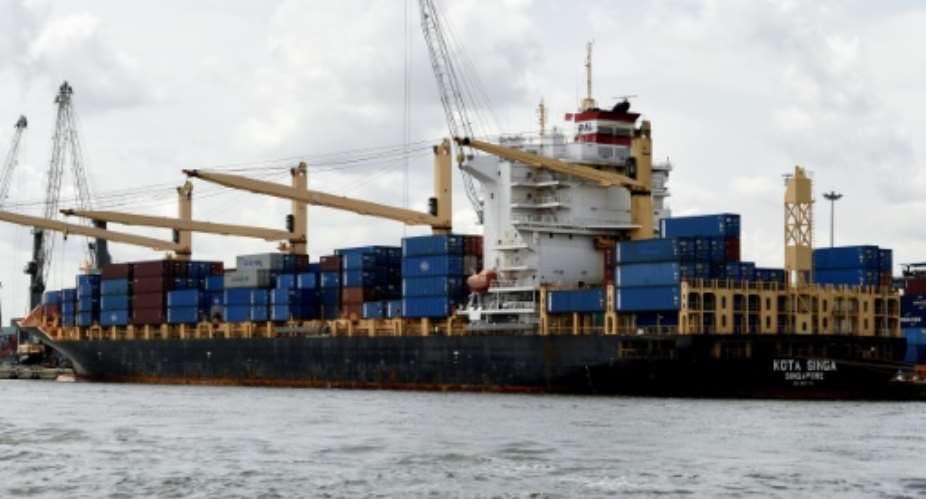Nigerian President Muhammadu Buhari will sign a landmark deal to scrap trade tariffs among African countries at an upcoming summit of the continent's leaders, his office said.
Africa's most populous country has been one of only three African states to hold back on inking the accord, after local manufacturers said they would be badly hit by liberalisation.
But in a tweet the presidency said Buhari would sign the pact when leaders of the 55-nation African Union meet in Niger's capital Niamey from this weekend.
The African Continental Free Trade Area (AfCTA) aims at spurring business across Africa, a market of 1.2 billion people -- expected to reach 2.5 billion by 2050 -- and a current GDP of $2.5 trillion (2.22 billion euros).
The agreement would progressively eliminate tariffs among AU members, creating the world's largest free-trade area since the formation of the World Trade Organization (WTO).
Nigeria had been a key backer when talks on the AfCTA got underway in 2002.
But it abruptly changed course shortly before the draft deal was signed last year, amid pressure from unions and businesses fearful of the impact of lowered trade barriers.
But the presidency announced late Tuesday that Nigeria would now join the club.
"Nigeria is signing the #AfCFTA Agreement after extensive domestic consultations, and is focused on taking advantage of ongoing negotiations to secure the necessary safeguards against smuggling, dumping and other risks/threats," it said.
Last week, a special government panel formed to study the potential impact of joining AfCFTA recommended that Buhari sign Nigeria up.
The trade deal "provides immense opportunities for Nigeria's manufacturing and service companies to expand to Africa", the panel's chair, Desmond Guobadia, said.
AU Trade Commissioner Albert Muchanga welcomed Nigeria's decision as a "good and important development" and urged the two remaining non-signatories, Benin and Eritrea, to follow suit.
"Two more to go and an All Africa Market will start shaping up," he wrote on Twitter.
In addition to signing the agreement, Nigeria will still need to ratify it if it wants to emulate Africa's other economic heavyweights, Egypt, Ethiopia, Kenya and South Africa.
The AfCTA formally came into force at the end of May after it crossed a threshold of ratification by at least 22 countries.
However, key details still have to be thrashed out to make it operational, including the creation of institutional structures and key regulations such as rules of origin.
At present, only 16 percent of trade by African nations is with continental neighbours.
One reason is that average tariffs on intra-African trade, of 6.1 percent, are higher than on exports outside of Africa.
The Economic Commission for Africa (ECA) estimates AfCTA "has the potential both to boost intra-African trade by 52.3 per cent by eliminating import duties, and to double this trade if non-tariff barriers are also reduced", the AU says on its website.
'Step forward'
Charles Robertson, the global chief economist with Renaissance Capital, said signing "the deal is a step forward for the efficiency of the Nigerian economy".
He said Nigeria "has taken a protectionist approach to development, more similarly to Latin America than Asia, but this is a step away from protectionism which will make Nigeria more competitive".
Nigerian business operators also hailed the decision to sign the agreement.
"It is a welcome development. Though it is coming rather late. It's better late than never," said Muda Yusuf, the head of Lagos Chamber of Commerce and Industry.
"Signing the deal will reaffirm Nigeria's prime position in Africa," he said.
"The Africa free trade agreement provides an opportunity to assert ourselves on the continent."
Yusuf said the initial concerns by manufacturers of not being part of the negotiations were being addressed.
"We feel such concerns will be addressed in the final document. We see the agreement as work-in-progress. Nothing is cast in iron. The agreement can be fine-tuned to meet the expectations of all the stakeholders," he added.





 This IMANI job no dey pap; the people you are fighting for are always fighting y...
This IMANI job no dey pap; the people you are fighting for are always fighting y...
 Prof. Naana Opoku-Agyemang has changed; you can see a certain sense of urgency –...
Prof. Naana Opoku-Agyemang has changed; you can see a certain sense of urgency –...
 MFWA Executive Director slams Akoma FM for engaging in ‘irresponsible’ media pra...
MFWA Executive Director slams Akoma FM for engaging in ‘irresponsible’ media pra...
 ‘Women must become millionaires too’ — Prof Jane Naana on establishment of Women...
‘Women must become millionaires too’ — Prof Jane Naana on establishment of Women...
 Some believe only in Ghanaian votes, not Ghana — Kofi Asare jabs politicians
Some believe only in Ghanaian votes, not Ghana — Kofi Asare jabs politicians
 Plan to make BEST sole aggregator of Sentuo Oil Refinery will create market chal...
Plan to make BEST sole aggregator of Sentuo Oil Refinery will create market chal...
 2024 elections: I can't have the man I removed from office as my successor — Aku...
2024 elections: I can't have the man I removed from office as my successor — Aku...
 2024 Elections: Immediate-past NPP Germany Branch Chairman garners massive votes...
2024 Elections: Immediate-past NPP Germany Branch Chairman garners massive votes...
 Gov’t focused on making Ghana energy self-sufficient, eco-friendly – Akufo-Addo
Gov’t focused on making Ghana energy self-sufficient, eco-friendly – Akufo-Addo
 April 25: Cedi sells at GHS13.74 to $1, GHS13.14 on BoG interbank
April 25: Cedi sells at GHS13.74 to $1, GHS13.14 on BoG interbank
